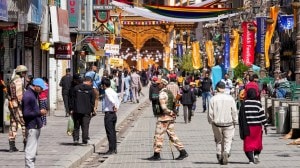Need obesity and weight loss surgery but worried about costs? Now insurance cover is easy
Bariatric surgeries entail a layered verification process that delays approvals but things are moving as surgeries go up.
 Insurance doesn’t cover surgeries done for cosmetic reasons. Neither does it cover obesity due to psychiatric and eating disorders, obesity due to certain drugs and untreated hormonal imbalances.
Insurance doesn’t cover surgeries done for cosmetic reasons. Neither does it cover obesity due to psychiatric and eating disorders, obesity due to certain drugs and untreated hormonal imbalances.
For a long time Kolkata-based Dr Ratul Pal, 41, had been battling weight issues because of his severe arthritic knees and was barely able to move around. His obesity posed a serious health threat and doctors advised bariatric surgery because of the combined risk of diabetes, hypertension and high levels of lipids in his blood.
“I planned a surgery in 2021 but although insurance cover for bariatric surgery was introduced in 2019, I had a waiting period given my pre-existing conditions. Finally, my surgery was done on October 15, 2024, at Manipal Hospital, Dwarka, and my insurance covered my bill of Rs 4.5 lakh. From 116 kg, my current weight is around 98 kg,” says Dr Pal, who has not faced any side effects or complications. “The osteoarthritic knee problem has gone down by 80 per cent. I am not taking any medicine for cholesterol or hypertension, I am not taking any blood sugar-lowering drugs either and managing to build in some activity,” adds Dr Pal.
Many others with morbid obesity, where the body mass index (BMI) — calculated by dividing body weight in kilograms by height in metres squared (m2) —– is 40 or higher, have got relief. Doctors say that with bariatric surgeries (between Rs 4 and 6 lakh) now being covered by different health insurance schemes, there has been an uptick in their numbers over the last few years, even in private hospitals. Dr Arun Prasad, surgical gastroenterologist, Bariatric Surgery, Indraprastha Apollo Hospitals, Delhi, says the number of patients seeking surgeries has gone up by one-and-a-half times on an average, from 55-60 a year in 2020 to 90 now.
Gaurav Shrivastav, Delhi-based financial and insurance adviser, predicts that with the inclusion of bariatric surgery in family health insurance plans, individual health plans and even a critical illness insurance policy, up to 38 per cent people are expected to benefit in rural areas and up to 30 per cent in urban areas.
What are the conditions for coverage?
The patient should be at least 18 years old. The surgeon should confirm that the applicant has Class III Obesity (extreme obesity) with a BMI of 40 or a Class II Obesity with a BMI between 35 and 39 along with a co-morbidity. That could be uncontrolled diabetes, cardiovascular disease, history of coronary artery disease with a surgical intervention such as bypass or angioplasty, fatty liver and cardiopulmonary problems arising out of conditions like severe Obstructive Sleep Apnea (OSA).
Insurance doesn’t cover surgeries done for cosmetic reasons. Neither does it cover obesity due to psychiatric and eating disorders, obesity due to certain drugs and untreated hormonal imbalances.
Dr Sandeep Aggarwal, laparoscopic, bariatric, GI and renal transplant surgeon at Manipal Hospital, Dwarka, who conducted Dr Pal’s surgery in 2024, says the cut-offs need to go down. “Last year, the International Federation for Surgery of Obesity and Metabolic Disorders lowered the cut-off for BMI because there’s so much evidence now about the safety and efficacy of surgery over other means. So international cutoffs are 30 and 35 but insurance companies here still follow old standards. They want to minimise the number of patients,” says Dr Aggarwal.
According to Dr Prasad, the IRDA (Insurance Regulatory and Development Authority) has given clear guidelines that help patients opt for life-saving surgeries. “Any patient who has an insurance over four years old and a BMI of 40 plus, is eligible for surgery,” he says.
 Insurance doesn’t cover surgeries done for cosmetic reasons
Insurance doesn’t cover surgeries done for cosmetic reasons
Why is claiming insurance a cumbersome process?
“I sent my test reports and my policy documents to the hospital. There was a lot of to and fro between my doctor and my insurance company for full approval. Most plans have an initial waiting period of around 30 days. If you have pre-existing conditions like I did, you may have to wait for one to three years. My surgery was slotted when the insurance company gave an approval for more than 50 per cent of costs. After the surgery, we submitted documents and I got almost Rs 4,08,000 as reimbursement. I had to pay only Rs 4,000 from my pocket,” says Dr Pal.
Dr Aggarwal says such scrutiny happens because bariatric surgeries in India are newer compared to the West. “Some insurance companies still have a waiting period of two to three years before they allow patients to be reimbursed. But some corporate insurance policies now cover it straight away,” he says.
What are obstacles?
Dr Prasad, who has had to intervene in claims resolution, says, “The insurance companies raise a lot of questions and we have to literally fight, justifying why the patient needs it. Sometimes the insurance company asks the patient to pay up first and then claim reimbursement post-surgery.” However, he’s seeing things improving over the years.
Most claims are rejected over eligibility issues. “Many insurers require specific pre-approval steps, such as documented weight-loss attempts by the patient, dietitian consultations or psychological evaluations. They want to be sure that the bariatric surgery is being done as a life-saving option. They need evidence that previous treatment plans had been followed but did not yield desired results,” says Shrivastav.
Some insurers, while adhering to criteria like BMI and comorbid conditions, may factor in the patient’s age. “Also bariatric surgeries are of various types like gastric bypass (reducing stomach size and connecting it directly to the small intestine, bypassing a portion of both) sleeve gastrectomy (removing a large portion of the stomach) and adjustable gastric banding (placing a silicone band around the upper part of the stomach to create a smaller pouch, limiting food intake and promoting weight loss). This variability means that each patient’s coverage details need to be carefully reviewed and cross-referenced with insurer requirements,” says Dr Aggarwal.
Bariatric surgeries need pre-authorisation, and the process involves gathering specific documentation, such as medical necessity forms and physician referrals. Any missing or inaccurate documentation can lead to delays or denials. “However, as people regain their health and quality of life, insurers are gradually easing barriers,” says Shrivastav.



- 01
- 02
- 03
- 04
- 05



























